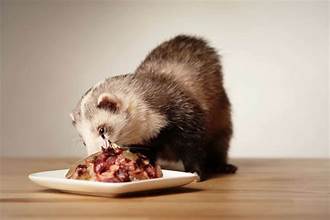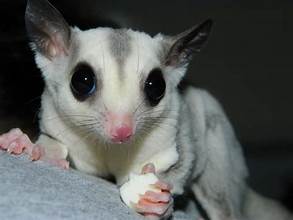So, you’re considering bringing a ferret into your home? That’s great news! These playful and curious creatures can be wonderful pets. However, before you welcome your new furball, it’s vital to grasp their unique dietary needs and watch out for potential health concerns that may arise.
Fueling the Fun:
Protein Power:
Aim for a commercial ferret food containing 32-40% protein. The right food provides the essential amino acids ferrets need for strong muscles, healthy organs, and a shiny coat.
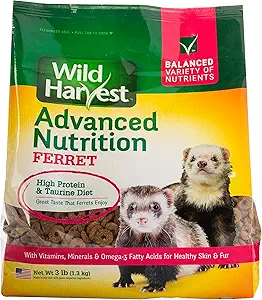
Fat Facts:
Don’t be afraid of fat! Ferrets get most of their energy from fat, and they aim for 15-30% in their diet.
Fiber Faux Pas:
Unlike other pets, ferrets have short digestive tracts and struggle with fiber. To avoid digestive issues, keep their food low in fiber (under 4%).
Commercial Comfort:
The best way to ensure your ferret gets the right balance of nutrients is with high-quality commercial ferret food. These kibbles are formulated specifically for their needs, providing a balanced diet that keeps them healthy and happy.
Water Wonderful:
Fresh, clean water should always be available. Most ferrets prefer a water bowl over a sipper bottle.
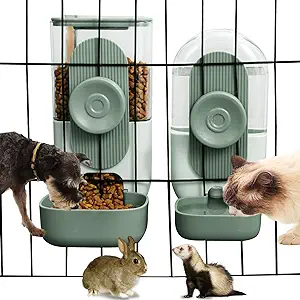
Treat Time:
Occasional treats are okay, but keep them healthy and infrequent. A small cube of cooked chicken or ferret-safe yogurt can be a pleasant surprise. Avoid sugary treats, chocolate (toxic to ferrets), and anything with a high fiber content.
Diet Don’ts:
Cat Food Confusion:
While ferrets seem similar to cats, their dietary needs differ. Regular cat food lacks the high protein content ferrets require.
Sugar Crash:
Avoid sugary treats or fruits. These can lead to weight gain and even health problems like insulinoma, a type of tumor.
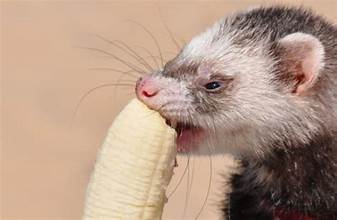
Table Scraps:
Our food is unhealthy for ferrets. Avoid processed foods, including dairy products and fatty meats.
Common Health Concerns:
Insulinoma is a type of tumor that can affect the pancreas. Signs such as excessive eating, weight loss, and lethargy are red flags that can help you stay informed and vigilant. Knowing these signs and acting early can make a significant difference in your ferret’s health.
Dental Disease:
Ferrets can develop dental problems like humans. Providing chew toys and regular vet checkups can help maintain good oral health.
Hairballs
This can concern ferrets, as they groom themselves frequently, and the fur can accumulate in their digestive system. To prevent this issue, your vet can recommend regular brushing and a hairball lubricant, which helps the hair pass through the digestive system more easily.
Bloat:
A life-threatening condition where the stomach twists. Avoid feeding your ferret right before playtime or exercise.
Building a Bond with Your Vet:
Regular veterinary checkups are not just a routine; they are a crucial part of your ferret’s health. These visits allow you to discuss your ferret’s diet, address any health concerns, and ensure your ferret is thriving. They are a way to show your ferret that you care about its well-being.
Understanding their dietary needs and potential health issues lets you keep your ferret happy, healthy, and ready for years of playful adventures.

